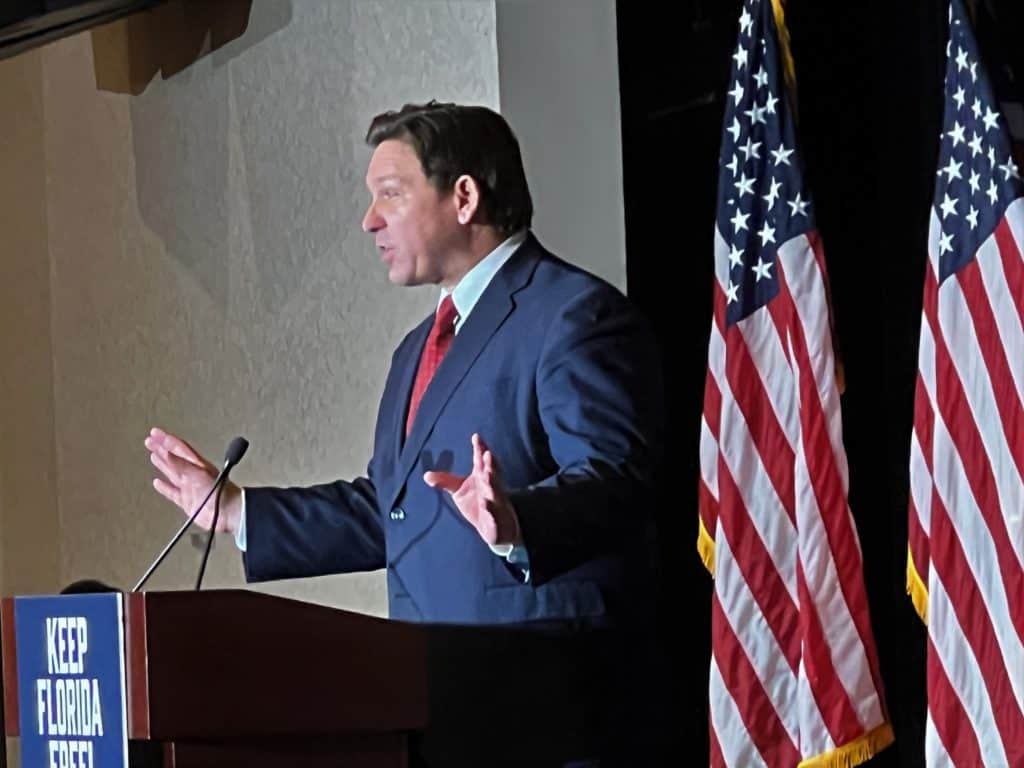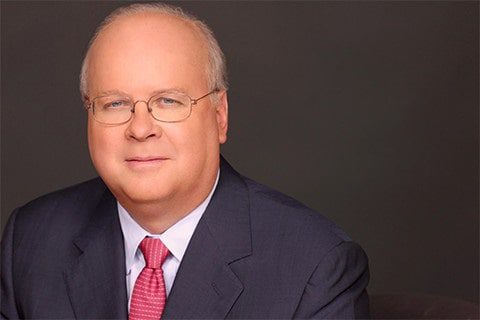
Florida Gov. Ron DeSantis in Tampa/AliveTampaBay file photo.
Opinion
By Karl Rove
In politics, even two days can make a difference.
As of a few weeks ago, some had written off Florida Gov. Ron DeSantis’s run at the GOP presidential nomination. The New York Times said he had “fallen flat on the national stage” and was “bogged down” by divisive issues. NBC News reported he “struggles in mastering interpersonal skills” and in “building up an operation.” In the Guardian’s opinion pages, Mr. DeSantis was said to be“flaming out,” his “boomlet” “done” even before he formally became a candidate.
Then came his visit last weekend to Iowa.
He attended GOP Rep. Randy Feenstra’s annual fundraising picnic in the state’s northwest, where he flipped pork burgers for a crowd of hundreds, and appeared at a Republican Party fundraiser in eastern Iowa. There, he and his wife were interviewed on stage, yielding moments both personal and funny. The DeSantis campaign also called a smart audible, adding a last-minute stop at a Des Moines barbecue joint near the site of a Saturday rally the Trump campaign canceled over weather concerns. This upstaged the former president and allowed Mr. DeSantis to dominate news in the state’s largest media market.
Those two days changed the tone of the coverage. The Times now says Mr. DeSantis impressed observers with his “aggressive political instincts.” His “successful political events” revealed the “enigmatic lighter side of his personality.” The Des Moines Register marveled at the Florida governor’s “growing apparatus” as he gained the endorsement of the Republican leaders in the Iowa House and Senate and 35 of their colleagues. This newspaper’s reporting highlighted the importance of “close-contact interaction” with candidates to Iowa caucus-goers.
This all is a reminder that the battle for a party’s nomination is long and winding. Every candidate gets time in the barrel with bad press, but things can change quickly. The contest is usually won by the candidate who turns in the best sustained performance, even if he started behind. If Mr. DeSantis builds on last weekend, he’ll be a real contender.
Ironically, Mr. DeSantis was helped by the presumptive front-runner’s laser focus on the negative. Donald Trump has spent months running Mr. DeSantis down, saying he needs “a personality transplant,” arguing he is only “an average governor,” and repeating his nonsensical, childish moniker, “Ron DeSanctimonious.” Mr. Trump even depicted Florida as full of “misery and despair” because of Mr. DeSantis while his campaign bragged about its extensive DeSantis oppo-research file.
Leaving aside the question of why Mr. Trump would move to a place of misery and despair, his preoccupation with Mr. DeSantis piqued the public’s interest while lowering its expectations of the governor. Republicans also recognize Florida is doing really well, adding jobs and drawing new residents. Many wonder: If Mr. DeSantis is so bad, how was he re-elected by nearly 20 points in a difficult year for Republicans and able to advance successful policy?
Perhaps Mr. Trump thought his constant belittling of Mr. DeSantis could destroy or cripple the main competition before he even got to campaign seriously. That was never going to work. Mr. Trump would have been better off using that time to boost his own profile by offering a forward-looking agenda. But apparently that’s the last thing he wants to do.
Mr. Trump’s campaign is full of other mystifying moves, such as his hyperfocus on poll numbers. Team Trump spams every Republican whose email address it can capture with updates on the latest surveys. Tuesday, I received four such announcements. At 10:08 a.m., I was informed that Mr. Trump “expands lead over GOP to largest yet.” A duplicate email appeared three minutes later. At 11:21 a.m., news arrived that he was leading big in Kentucky. Then at 2:58 p.m. his “lead widens” nationally while his principal “challenger hemorrhages support.”
Op-Ed by Mr. Rove, courtesy of rove.com, was first published in The Wall Street Journal.

Karl Rove served as Senior Advisor to President George W. Bush from 2000–2007 and Deputy Chief of Staff from 2004–2007. At the White House he oversaw the Offices of Strategic Initiatives, Political Affairs, Public Liaison, and Intergovernmental Affairs and was Deputy Chief of Staff for Policy, coordinating the White House policy-making process.
Mr. Rove has been described by respected author and columnist Michael Barone in U.S. News & World Report as “…unique…no Presidential appointee has ever had such a strong influence on politics and policy, and none is likely to do so again anytime soon.” Washington Post columnist David Broder has called Mr. Rove a master political strategist whose “game has always been long term…and he plays it with an intensity and attention to detail that few can match.” Fred Barnes, executive editor of The Weekly Standard, has called Mr. Rove “the greatest political mind of his generation and probably of any generation. He knows history, understands the moods of the public, and is a visionary on matters of public policy.”
Before Mr. Rove became known as “The Architect” of President Bush’s 2000 and 2004 campaigns, he was president of Karl Rove + Company, an Austin-based public affairs firm that worked for Republican candidates, non-partisan causes, and non-profit groups. His clients included over 75 Republican U.S. Senate, Congressional, and gubernatorial candidates in 24 states, as well as the Moderate Party of Sweden.

